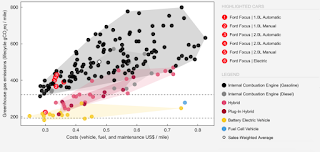Drivers overestimate the cost and underestimate the benefits of going electric.
“A lot of research has shown that American car buyers don’t know much about electric vehicles, and thus they regard them as a novel, unusual technology,” said David Greene, a professor of civil and environmental engineering at the University of Tennessee. “It’s a well-known theory in market research that the majority of consumers are reluctant to purchase a novel technology.”
Surveys show that most Americans can’t name a model of electric car, much less explain how it works. For now, the EV market is limited to early adopters — younger, wealthier drivers who want to own the latest tech. The average buyer is still wary of plug-in vehicles.
Consumers cite the limited range of EVs as a reason for favoring gas-powered gars, but this concern is largely unfounded. “You just develop slightly different habits,” Greene said. “When you go home and you park your car in the garage, you say, ‘Where am I going tomorrow? Oh, yeah. Better plug it in.’”
Research shows that even lower-end EVs have enough range to meet about 90 percent of driving needs. This holds true across cities as varied as New York and Houston. “You’ve got EVs that have ranges of hundreds of miles, and people have a 30-mile commute,” said Nick Sifuentes, executive director at Tri-State Transportation Campaign.
“A lot of people will never use the full range of their electric vehicle. They’re just not going to get anywhere close in their daily commute.”
Just as consumers underestimate the needed range of electric vehicles, they also overestimate the cost. Electric cars are often cheaper than gas-powered cars when accounting for fuel, repairs, and other expenses. Researchers evaluated the lifetime cost of various cars and found that electric vehicles are often cheaper than comparable gas-powered vehicles.
“The reason is that the lower fuel costs of EVs relative to gasoline-fueled cars compensate for the higher vehicle costs of EVs,” said Jessika Trancik, a professor of energy studies at MIT. A battery-powered Ford Focus, for example, will prove less expensive over the course of its life than a gas-powered Ford Focus.
Read more at Consumers Don’t Know Jack About Electric Cars

No comments:
Post a Comment